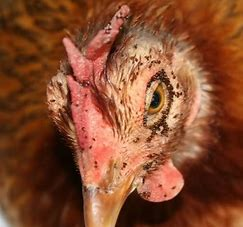

Fleas are small blood-sucking parasites that infest nearly every kind of mammal on earth. Some of them infest poultry, including chicken, turkeys, pigeons, game birds, canaries and various types of non-domesticated birds.
Fleas feed on the warm blood of their hosts. They use the nutrients in the process of laying eggs and thus produce even more fleas.
The stick-fast flea (Echindnophaga gallinacean) is one of the most troublesome parasites in poultry. It is a serious pest, as large numbers may cause progressive blood loss and related illnesses, and sometimes death. They are reddish brown in colour and smaller than other types of fleas. They ‘stick-fast’ onto the host, and do not move around like other fleas.
The most common place for the flea to attach is the head of poultry. Other sites are under the wings and on the breasts. A heavily infested bird can carry a black mass of fleas on its comb, wattles and behind its head, eye lids, ears, under the neck and further down the neck. There are seen mainly in warmer areas and can survive extremely low temperatures.
These parasites are not easily eradicated from poultry houses or free-range poultry farms that do not have water-tight flooring.
Stick-fast fleas also infest cattle, rabbits, rats, goats, cats, horses, dogs and sometimes people.
Understanding the life cycle of the stick-fast flea makes control methods easier to implement. The average life cycle is about four to five weeks, depending on seasonal conditions. It starts with a female laying the eggs, which is usually at night time. An adult female flea lives for about six weeks on the host and lays approximately 12 eggs per night. These eggs fall to the ground and hatch into larvae that feed on the ground litter. Two to four weeks later, the larvae burrow into the soil to a depth of 15 cm and form a cocoon. They particularly like sandy type of soils. Adult fleas emerge from the cocoon within two to three weeks, depending on temperature and humidity. An adult flea which cannot find a suitable host survives only for a short period.
Infestations by external parasites like stick-fast fleas in poultry flocks lead to serious loss in the form of decreased egg production, decreased egg quality, decreased poultry growth, inefficient poultry feed conversion and death in severe cases.
These parasites are blood feeders causing anaemia in birds that are highly infested. Anaemia reduces a bird’s efficiency, production and ability to withstand and overcome other diseases. Young chickens and brooding hens may die due to blood loss. Birds in production may refuse to lay in nests that are infested with external parasites.
Birds stressed by flea infestations lose weight, have pale combs and wattles, and their feathers are generally soiled with flea excrement.
Poultry welfare and behaviour can also be negatively affected when external parasite infestations multiply, with increases in behaviours (or vices) such as feather pecking.
Losses associated with such parasite infestations are, therefore, both in terms of decreased poultry production and control costs.
Management of flea infestation in poultry
The goal of poultry farmers is to reap all the benefits from their investments of time, money and labour. An essential step in reaching this goal is to maintain a healthy and parasite-free flock of birds. The health of your flock is important regardless of whether you are maintaining a backyard flock for pleasure, raising a flock for meat and/or egg production, or breeding top-quality birds for supply of breeding stock to other farmers.
Keeping external parasites at bay from birds can be done by the following conventional and alternative means:
Poultry management practices
General sanitation and cleanliness helps to prevent infestations of ecto-parasites. Poultry houses should be clean and parasite-free before moving new birds in. All new birds should be checked to make sure they are parasite-free before they are brought on to the farm.
Provide easy to clean roosts and nests with few hiding places. Housing designs should eliminate hiding places for ecto-parasites as much as possible and allow thorough house
 Contact Jaguza Support
Contact Jaguza Support